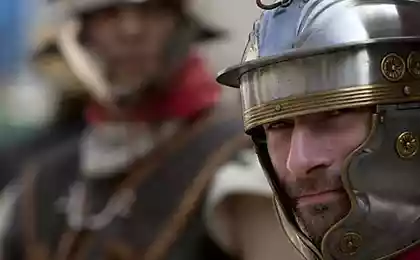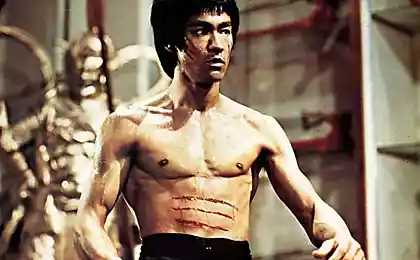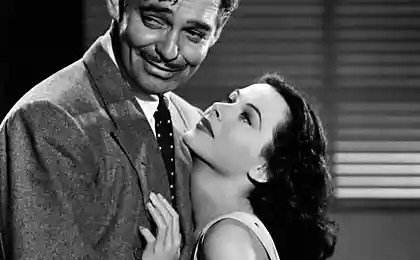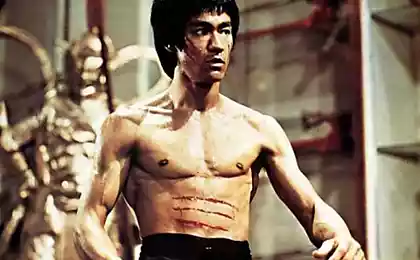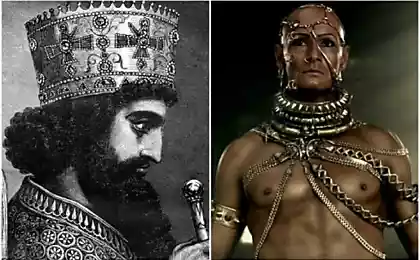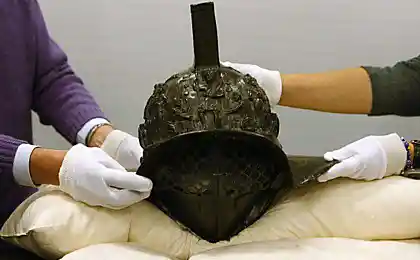2369
"Gladiator". History of creation
Continuing this theme: how to shoot a movie "Rambo" and how to shoot the film "Predator»
Former General Roman army, and now a slave-gladiator, the protagonist of the film reluctantly preparing for the next battle. Before leaving the arena resembles his master warrior, that he should not immediately hammer opponents like cattle, and pre "play" with them, entertaining the audience. "The public needs a hero, not a butcher," - he said. However, when the hero enters the fray, he and a few swift strokes shrewd deals with six Gladiators. Then he throws the sword into the box for guests of honor and knocks a table with drinks. "You have not entertained ?! You may not entertained ?! - Screaming crowd hero. - Is not that why you came here ?! "Spitting in disgust, he leaves the arena. The crowd at first hesitantly, then louder and harmonious chanting his nickname: "The Spaniard! Spaniard! Spaniard! »
16 Picchu + text.
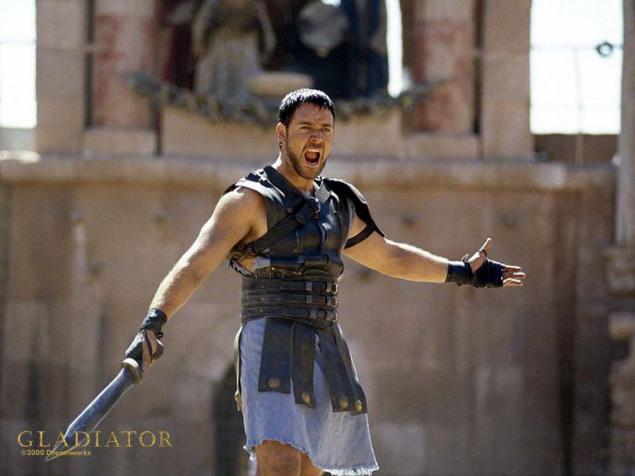
In the late 1990s, "peplum" (a film about the ancient world) was considered extinct genre, not able to interest a mass audience. Only madmen while could invest $ 100 million in a movie like this. However, these madmen were found and they were able to find a director who returned peplum title of "blockbuster genre." In 2000, DreamWorks and directed by Ridley Scott released became internationally popular and have earned $ 450 million picture called "Gladiator».
The idea of writing a screenplay about gladiators first visited David Franzoni in the days when she was not yet absolute madness. Peplum was a very popular genre in America, and in Southern Europe in the early postwar decades, until about the mid-1960s. So when in the late 1960s, young Franzoni went on a long trip to Europe and Asia in search of himself and inspiration, it was not clear that this genre has died a long time.
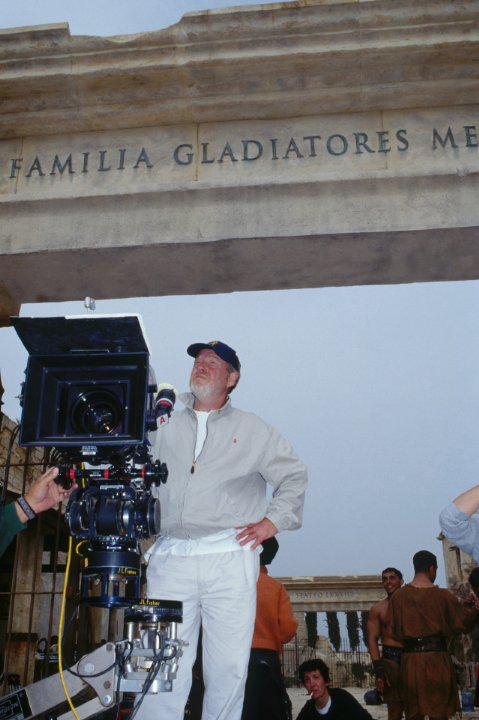
Then Franzoni not paid much attention to the thoughts that arose under the influence of ancient landmarks and popular science books of Daniel Mannix "Going to death" (this is not too well-known, but prolific American also wrote the novel "The Fox and the Hound", formed the basis of the same cartoon Studio Disney). However, his hooked spent in "Walking" comparison of ancient and modern entertainment. Mannix - sword-swallower and magician for the first profession, speaking more than one year in a traveling circus, - noted that the public in all ages drew blood, pain and death, and Franzoni seemed interesting to write ancient history, in which the audience would see the birth of modern fans, athletes and agents. After all, we should not forget that, for example, American football in the early XX century was not just a bloody and deadly sport. In 1904 alone, died on the field of 18 players, and the only US President Theodore Roosevelt was able to get to review the rules of the game. Which, however, is still very traumatic.
In subsequent decades, Franzoni has repeatedly recalled his youthful ideas. He read books on Roman history, examining preserved amphitheater, where once held gladiator fights, watching old movies, of which it was possible to draw interesting plot turns. However, his career still can not really started (the first film based on his script - the comedy "Jumping Jack" with Whoopi Goldberg - was lifted only in 1986), and because he could only work in earnest on a script that at least theoretically could be sold . Peplum one of them does not apply.
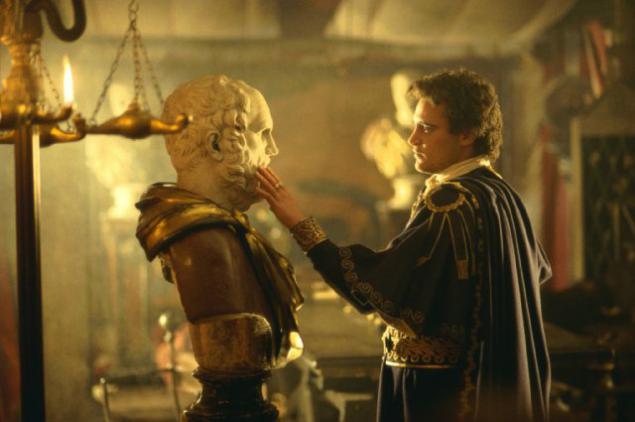
Self-confidence needed to work on such a scenario, Franzoni found only in the mid-1990s, when living in Rome, pored over the text spilbergovskogo "Amistad" (historical drama about the trial during the American slavery were released in 1997) . Unlike many from Hollywood, Spielberg was ready to listen to "zaviralnye" idea, and after the completion of "Amistad" Franzoni decided to submit to the director and producer of the draft "Gladiator».
The basis of the new script writer put him remember the real story that ruled in the second half of the II century AD Emperor Commodus took part in gladiatorial combat, and that he was killed by a gladiator named Narcissus. It happened, however, not in the arena, and in the bath - senators bribed Gladiator, who was the personal coach of the emperor, and erratic ruler Narcissus strangled with his bare hands. But Franzoni has decided that in his film Narcissus kill Commodus in the Roman Coliseum, and that he did not do it for money, but for very personal reasons, which will turn it from a cynical mercenary nice character the audience.
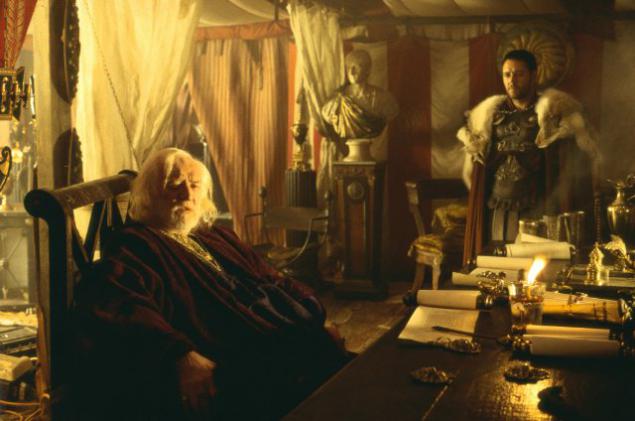
What would it be for a reason? Answer prompted American screenwriter peplum epic "The Fall of the Roman Empire", delivered in 1964 by director Anthony Mann. In this picture, which has little to do with real history, the main character was a general Gaius Livius (Stephen Boyd), a loyal friend and adviser to Emperor Marcus Aurelius (Alec Guinness), and the lover of his daughter Lucilla (Sophia Loren). According to the film, virtuous by Roman standards emperor wanted Libya to hand over power, not its cruel and dissolute son Commodus (Christopher Plummer), but the henchmen of the last ruler was poisoned before he has notified its decision to the Roman nobility, and Commodus still became emperor. That eventually led to rebellion against Commodus, headed by Livy and Lucilla. In the film's climax Livy and Commodus fought at the Forum, the central square of Rome, and the general, of course, won, spear pierced the emperor.
Combining fictional Guy Libya with the real Narcissus, Franzoni invented a film about how Marcus Aurelius is preparing to hand over power to General virtuous, and Commodus kills his father, assigns authority and trying to get rid of his father's friend. So the poor fellow-general who yearned to return home and live a peaceful life, becomes a slave-gladiator. Keeping the secret of his origin, he fights in the arena, knowing that the custom of the emperor personally congratulates the best fighter who conquered Rome with their art. For a warrior is the only way to get close to the emperor close enough to get back at him for himself, for Marcus Aurelius and, most importantly, for his murdered family, to which he was not able to return.
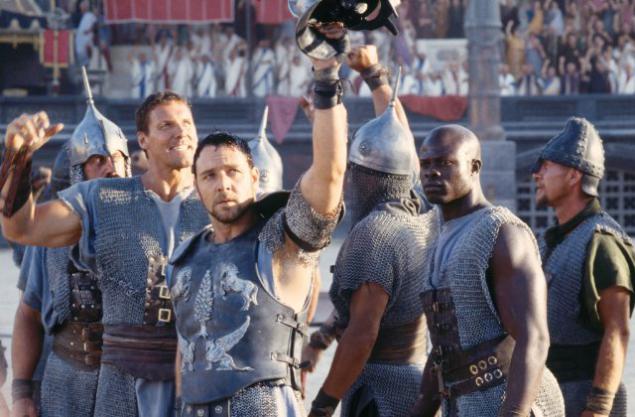
Originally referred to the writer of his hero Narcissus, but then he borrowed the sonorous name of the Roman general Maximus IV century (Maxim) and renamed the Spanish character in Decius Maximus Meridia from Spain. This, incidentally, was not composed entirely correct name. According to the rules of the Roman character had to call Decius Maximus Merida (Decius - personal name, Merida - birth name, Maximus - the family name, indicating the kind of branch).
Why Franzoni was important to Maximus in the beginning of the film was tired of fighting warrior, dreaming about the arms of his wife, son and games growing grapes? Firstly, to make a professional killer cute, not bloodthirsty character. Secondly, to hint at a parallel between the Roman and American empires. Throughout the 1990s, the United States remains the only superpower, played a "planetary policeman" and sent their military in one or the other of the world backwater. Therefore, screenwriter reasonably believed that the audience will like the hero, tired knead "barbaric" dirt and who wants to finally do what is important to him, and not for the empire.
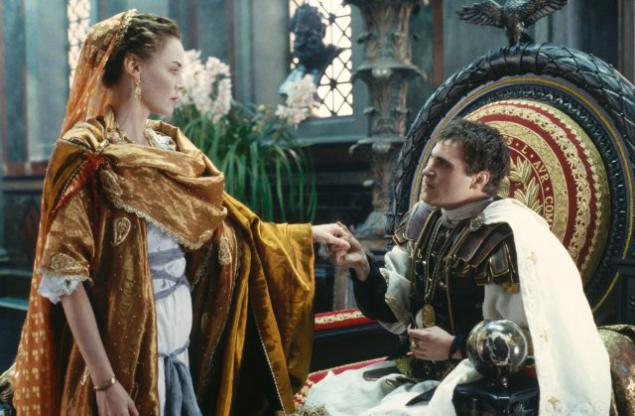
When Franzoni delivered its judgment on the outline of Steven Spielberg's DreamWorks as posing a potential investor and Douglas Wick ("Wolf," "Working Girl") as a potential producer, they immediately seized on the project. They liked that Franzoni wants to offer the audience is not an educational tour in a strange, unfamiliar world, and dramatic journey into recognizable past, where much similar to modern America. They also understood that computer technology will create more impressive Ancient Rome, than that which can be seen in films early 1960s. And, of course, they captured the complex professional task - to revive the genre that was believed dead and buried. After all, Spielberg and the late Vic Hollywood peplum films were childhood that inspired them to become filmmakers.
Of course, the long-term scenario for this movie was not enough. Producers needed a director who would be able to create compelling Ancient Rome. Plus, since the picture was supposed to be not only a big-budget action movie, but also a psychological drama, director of the tape had to shoot with equal skill and grand chamber scene. As directors of this caliber are rare, producers quickly found his "Roman" in the face of Ridley Scott who has had the audience in a futuristic world of "Blade Runner" and studied psychology in the military "GI Jane." Knowing that Scott foremost painter (decorator first profession), Vic sent him not only the script Franzoni, but also a picture of the French academics Jean-Leon Gerome "Finish Him!" (1872), depicting a gladiator, who stands over the defeated enemy and waits viewers' decision on the fate of the loser. The director took one look at the reproduction, to agree to remove the "Gladiator."
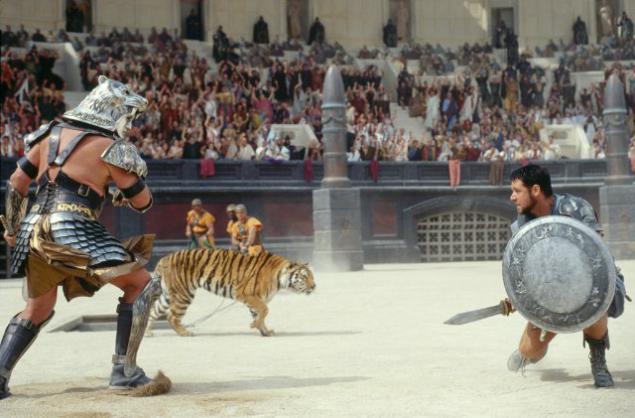
Next was a tedious and stressful job on the script. Scott was well aware that in this movie is very easy to lose viewers, confusing their pretentious dialogue, plot twists and historical details. But he also did not want to "Gladiator" seemed primitive crafts, filmed just for the sake of fighting and computer effects. So he and his colleagues for so long and carefully polished the text that you have completed this process only by the end of filming.
The main stumbling block for them was the question of who of the characters must survive until the final credits. Sketch Franzoni was pretty tough, and it did not reach to the end of almost no one, including the main character. Studio, on the other hand, wanted the final survived almost everything except the villains, that ending was happy as possible, and so it was then about whom to shoot a sequel.
Fortunately for the film, Scott sided Franzoni and ordered a new screenwriter John Logan, previously wrote with Oliver Stone screenplay sports drama "Any Given Sunday", kill at least seven Maximus. To the hero was a powerful and causes the viewer's sympathy motivation hacked through the crowds did not make him a gladiator. However, the death of a family deprived Maximus full happy ending and turns it into a banal avenger who wants to fill someone else's blood pain in his heart.
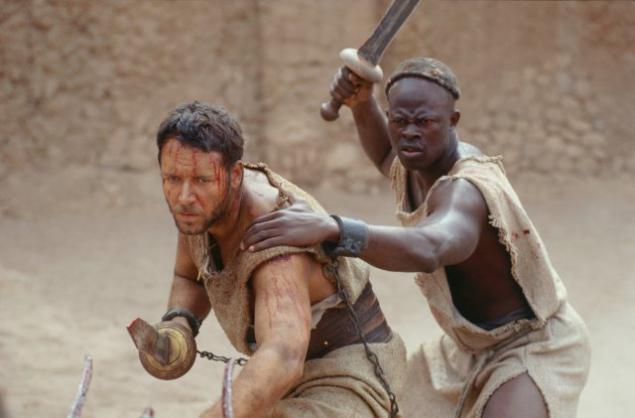
Found a way out only the third screenwriter William Nicholson, nominated "Oscar" for the biopic about the author of the "Chronicles of Narnia" by CS Lewis "Shadowland". He offered to provide a picture of the set of references Champs Elysées - paradise gardens, where, according to ancient mythology, the afterlife righteous conduct. Maximus let the whole picture tends to the Elysian Fields, and dying in the final to reach them, to be reunited with his wife and son. Of course, he can go there at any time. But suicide - unworthy of death for a warrior who has not yet completed his earthly affairs, and not the will of the late emperor. That is not removed from power unworthy of her Commodus. And, of course, revenge - also a good thing. If it is not the only motivation of the protagonist.
In addition to making the film, though sad, but still a happy ending, this scenic course decided two important issues. First, he made a hard and cruel "Gladiator" acceptable for sensitive women. What woman does not will appreciate a man who thinks only about how to meet again with his wife and son?
Secondly, the filmmakers were finally able to explain to myself and the audience why the emperor goes to battle with the undefeated gladiator (plan to avenge the governor general on their first "date" in the arena of falls, but in the final ribbon hero and villain still converge alone) . After all, if Maximus healthy and strong, then Commodus has no chance of winning. But if the emperor before the fight fatally Gladiator, he will enter the arena, believing that will easily cope with the enemy and show their "courage", beating supervoinov before the eyes of Rome. In turn, Maximus will have to gather all his will into a fist to dying, yet punish Commodus for his crimes. And it will make the final battle is not only dramatic, but also touching.
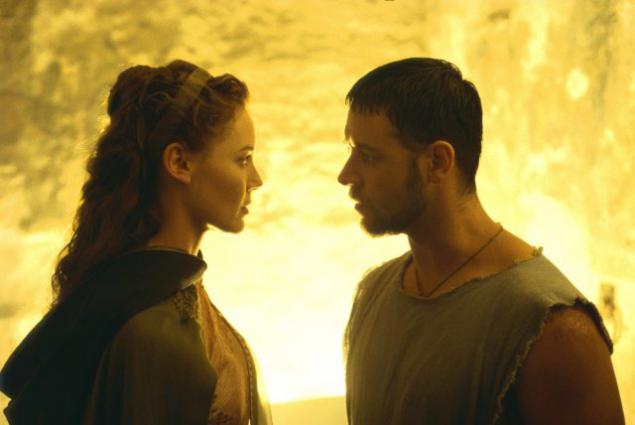
Choosing an actor who could play all this, the producers first try on a Mel Gibson, but the star of "Braveheart" announced that too old for such roles. Because at that time he was not yet 45 years old, it is logical to assume that the actor just did not want to communicate with the new historical Opik, but still does not play a fighter for people's freedom, and the conqueror of the "barbarians", among whom were the ancestors of the Scots who fought for its independence in "Heart».
In the absence of superstar producers and Ridley Scott were content with the rising star, and also from the vicinity of the smallest continent (there is air in Australia is something from which there continually born appropriate for Hollywood "tough guys"). The role of Maximus received a New Zealander Russell Crowe, who two years earlier flashed in neonuare "LA Confidential." Crow at the time was 35 years old, and he was, frankly, too young for the honored Roman general. But with a beard (and, perhaps, without a beard) actor looked older than his actual age, and because he was an excellent Maximus. Also consider Antonio Banderas and Hugh Jackman.
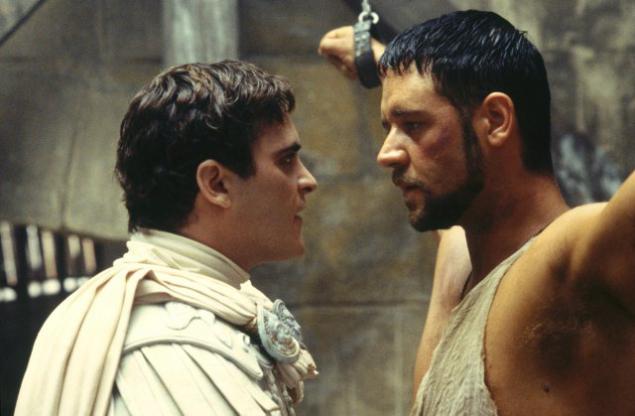
When Scott offered the role of Emperor Commodus 25-year-old Joaquin Phoenix, he was shocked. First play only modern guys Phoenix even imagine myself could not image the Roman dictator. But the director found that the actor can portray a complex combination of guile, weakness, depravity and "possessed of courage", which is a Commodus. And Scott has not lost.
Did not miss director and actress with an invitation to the role of Lucilla, Commodus's sister and former lover Maximus, which still feeds him a warm feeling (this story detail has been inherited from the "Fall of the Roman Empire"). Scott Crowe been looking for the same age, which would feel the imperial become uncommon intelligence, and he stopped Dane Connie Nielsen, debuted in the US in the 1997 film "The Devil's Advocate».
Other roles are mainly filled with well-known British actors Scott (to slightly delay the painting of American audiences and to emphasize that it is still a story about another country and another time, almost all the actors played the tape with an English accent). So, the owner and trainer of gladiators Maximus called Proximo played Oliver Reed, Athos British "The Three Musketeers" in 1973, and the opposing Commodus Gracchus portrayed outstanding theater actor Derek Jacobi, Claudius of "Hamlet" by Kenneth Branagh.
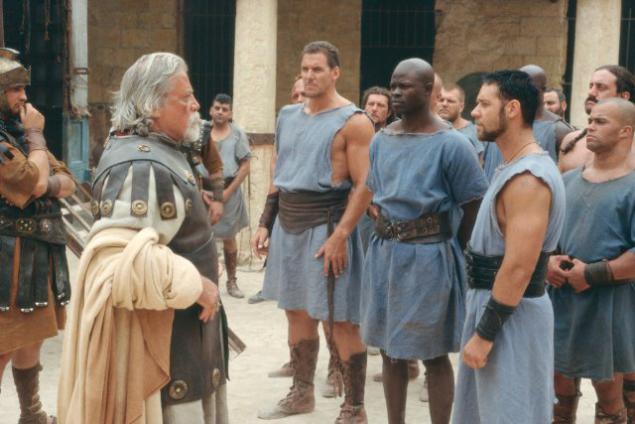
However, since Rome was a multinational empire, without explicitly "ethnic" actors Scott still has not done. The black gladiator Juba, best friend Maximus, played by Djimon Hounsou native of Benin. Senior gladiator Hagen Germans portrayed the former German bodybuilder Ralf Moeller ("Cyborg", "Universal Soldier", the main contender for the villainous role in "Terminator 2"). In the same legendary Gladiator Tiger from Gaul reincarnated accustomed to the roles husky Danish athlete and bodybuilder Sven-Ole Thorsen, often co-starred with Arnold Schwarzenegger ("Conan the Barbarian", "Running Man", "The Twins»).
In contrast to the "Blade Runner," Ridley Scott's work on "Gladiator" could rely on experts in antiquity. But he's not really been located to listen to them. For his taste, that the Roman Empire, which he saw in books and old movies, was more amusing than majestic. White toga, incumbency on couches instead of sitting at the table, primitive helmets and armor - it was historically accurate, but artistically unconvincing. And Ridley Scott, along with production designer Arthur Max ("Seven", "GI Jane"), a decorator Krispianom Sallis ("Aliens") and costume designer Yates Genty created his own, partly fictional Roman Empire with a colorful and sophisticated dresses, with better armor and weapons (sometimes more medieval than antique) and closer to our demeanor. So much so, that the movie was filmed a scene in which the soldiers were executed to shoot from a bow. While shooting in the world began only after the appearance of reliable firearms (why waste arrows, if you can hang a criminal or cut off his head?).
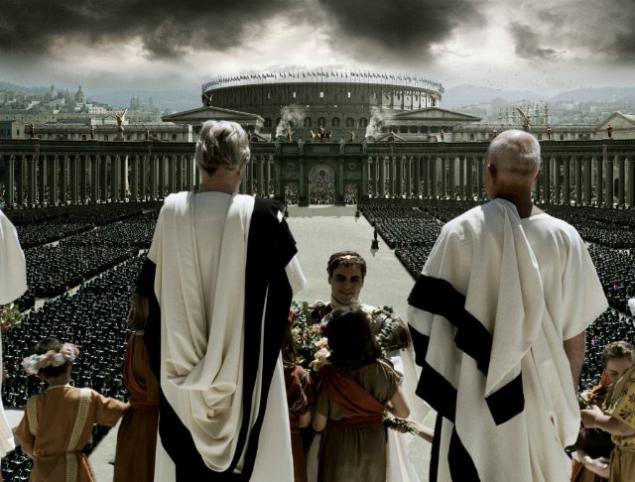
In some respects, however, "Gladiator" received less modern than the Roman Empire II century AD.
Former General Roman army, and now a slave-gladiator, the protagonist of the film reluctantly preparing for the next battle. Before leaving the arena resembles his master warrior, that he should not immediately hammer opponents like cattle, and pre "play" with them, entertaining the audience. "The public needs a hero, not a butcher," - he said. However, when the hero enters the fray, he and a few swift strokes shrewd deals with six Gladiators. Then he throws the sword into the box for guests of honor and knocks a table with drinks. "You have not entertained ?! You may not entertained ?! - Screaming crowd hero. - Is not that why you came here ?! "Spitting in disgust, he leaves the arena. The crowd at first hesitantly, then louder and harmonious chanting his nickname: "The Spaniard! Spaniard! Spaniard! »
16 Picchu + text.

In the late 1990s, "peplum" (a film about the ancient world) was considered extinct genre, not able to interest a mass audience. Only madmen while could invest $ 100 million in a movie like this. However, these madmen were found and they were able to find a director who returned peplum title of "blockbuster genre." In 2000, DreamWorks and directed by Ridley Scott released became internationally popular and have earned $ 450 million picture called "Gladiator».
The idea of writing a screenplay about gladiators first visited David Franzoni in the days when she was not yet absolute madness. Peplum was a very popular genre in America, and in Southern Europe in the early postwar decades, until about the mid-1960s. So when in the late 1960s, young Franzoni went on a long trip to Europe and Asia in search of himself and inspiration, it was not clear that this genre has died a long time.

Then Franzoni not paid much attention to the thoughts that arose under the influence of ancient landmarks and popular science books of Daniel Mannix "Going to death" (this is not too well-known, but prolific American also wrote the novel "The Fox and the Hound", formed the basis of the same cartoon Studio Disney). However, his hooked spent in "Walking" comparison of ancient and modern entertainment. Mannix - sword-swallower and magician for the first profession, speaking more than one year in a traveling circus, - noted that the public in all ages drew blood, pain and death, and Franzoni seemed interesting to write ancient history, in which the audience would see the birth of modern fans, athletes and agents. After all, we should not forget that, for example, American football in the early XX century was not just a bloody and deadly sport. In 1904 alone, died on the field of 18 players, and the only US President Theodore Roosevelt was able to get to review the rules of the game. Which, however, is still very traumatic.
In subsequent decades, Franzoni has repeatedly recalled his youthful ideas. He read books on Roman history, examining preserved amphitheater, where once held gladiator fights, watching old movies, of which it was possible to draw interesting plot turns. However, his career still can not really started (the first film based on his script - the comedy "Jumping Jack" with Whoopi Goldberg - was lifted only in 1986), and because he could only work in earnest on a script that at least theoretically could be sold . Peplum one of them does not apply.

Self-confidence needed to work on such a scenario, Franzoni found only in the mid-1990s, when living in Rome, pored over the text spilbergovskogo "Amistad" (historical drama about the trial during the American slavery were released in 1997) . Unlike many from Hollywood, Spielberg was ready to listen to "zaviralnye" idea, and after the completion of "Amistad" Franzoni decided to submit to the director and producer of the draft "Gladiator».
The basis of the new script writer put him remember the real story that ruled in the second half of the II century AD Emperor Commodus took part in gladiatorial combat, and that he was killed by a gladiator named Narcissus. It happened, however, not in the arena, and in the bath - senators bribed Gladiator, who was the personal coach of the emperor, and erratic ruler Narcissus strangled with his bare hands. But Franzoni has decided that in his film Narcissus kill Commodus in the Roman Coliseum, and that he did not do it for money, but for very personal reasons, which will turn it from a cynical mercenary nice character the audience.

What would it be for a reason? Answer prompted American screenwriter peplum epic "The Fall of the Roman Empire", delivered in 1964 by director Anthony Mann. In this picture, which has little to do with real history, the main character was a general Gaius Livius (Stephen Boyd), a loyal friend and adviser to Emperor Marcus Aurelius (Alec Guinness), and the lover of his daughter Lucilla (Sophia Loren). According to the film, virtuous by Roman standards emperor wanted Libya to hand over power, not its cruel and dissolute son Commodus (Christopher Plummer), but the henchmen of the last ruler was poisoned before he has notified its decision to the Roman nobility, and Commodus still became emperor. That eventually led to rebellion against Commodus, headed by Livy and Lucilla. In the film's climax Livy and Commodus fought at the Forum, the central square of Rome, and the general, of course, won, spear pierced the emperor.
Combining fictional Guy Libya with the real Narcissus, Franzoni invented a film about how Marcus Aurelius is preparing to hand over power to General virtuous, and Commodus kills his father, assigns authority and trying to get rid of his father's friend. So the poor fellow-general who yearned to return home and live a peaceful life, becomes a slave-gladiator. Keeping the secret of his origin, he fights in the arena, knowing that the custom of the emperor personally congratulates the best fighter who conquered Rome with their art. For a warrior is the only way to get close to the emperor close enough to get back at him for himself, for Marcus Aurelius and, most importantly, for his murdered family, to which he was not able to return.

Originally referred to the writer of his hero Narcissus, but then he borrowed the sonorous name of the Roman general Maximus IV century (Maxim) and renamed the Spanish character in Decius Maximus Meridia from Spain. This, incidentally, was not composed entirely correct name. According to the rules of the Roman character had to call Decius Maximus Merida (Decius - personal name, Merida - birth name, Maximus - the family name, indicating the kind of branch).
Why Franzoni was important to Maximus in the beginning of the film was tired of fighting warrior, dreaming about the arms of his wife, son and games growing grapes? Firstly, to make a professional killer cute, not bloodthirsty character. Secondly, to hint at a parallel between the Roman and American empires. Throughout the 1990s, the United States remains the only superpower, played a "planetary policeman" and sent their military in one or the other of the world backwater. Therefore, screenwriter reasonably believed that the audience will like the hero, tired knead "barbaric" dirt and who wants to finally do what is important to him, and not for the empire.

When Franzoni delivered its judgment on the outline of Steven Spielberg's DreamWorks as posing a potential investor and Douglas Wick ("Wolf," "Working Girl") as a potential producer, they immediately seized on the project. They liked that Franzoni wants to offer the audience is not an educational tour in a strange, unfamiliar world, and dramatic journey into recognizable past, where much similar to modern America. They also understood that computer technology will create more impressive Ancient Rome, than that which can be seen in films early 1960s. And, of course, they captured the complex professional task - to revive the genre that was believed dead and buried. After all, Spielberg and the late Vic Hollywood peplum films were childhood that inspired them to become filmmakers.
Of course, the long-term scenario for this movie was not enough. Producers needed a director who would be able to create compelling Ancient Rome. Plus, since the picture was supposed to be not only a big-budget action movie, but also a psychological drama, director of the tape had to shoot with equal skill and grand chamber scene. As directors of this caliber are rare, producers quickly found his "Roman" in the face of Ridley Scott who has had the audience in a futuristic world of "Blade Runner" and studied psychology in the military "GI Jane." Knowing that Scott foremost painter (decorator first profession), Vic sent him not only the script Franzoni, but also a picture of the French academics Jean-Leon Gerome "Finish Him!" (1872), depicting a gladiator, who stands over the defeated enemy and waits viewers' decision on the fate of the loser. The director took one look at the reproduction, to agree to remove the "Gladiator."

Next was a tedious and stressful job on the script. Scott was well aware that in this movie is very easy to lose viewers, confusing their pretentious dialogue, plot twists and historical details. But he also did not want to "Gladiator" seemed primitive crafts, filmed just for the sake of fighting and computer effects. So he and his colleagues for so long and carefully polished the text that you have completed this process only by the end of filming.
The main stumbling block for them was the question of who of the characters must survive until the final credits. Sketch Franzoni was pretty tough, and it did not reach to the end of almost no one, including the main character. Studio, on the other hand, wanted the final survived almost everything except the villains, that ending was happy as possible, and so it was then about whom to shoot a sequel.
Fortunately for the film, Scott sided Franzoni and ordered a new screenwriter John Logan, previously wrote with Oliver Stone screenplay sports drama "Any Given Sunday", kill at least seven Maximus. To the hero was a powerful and causes the viewer's sympathy motivation hacked through the crowds did not make him a gladiator. However, the death of a family deprived Maximus full happy ending and turns it into a banal avenger who wants to fill someone else's blood pain in his heart.

Found a way out only the third screenwriter William Nicholson, nominated "Oscar" for the biopic about the author of the "Chronicles of Narnia" by CS Lewis "Shadowland". He offered to provide a picture of the set of references Champs Elysées - paradise gardens, where, according to ancient mythology, the afterlife righteous conduct. Maximus let the whole picture tends to the Elysian Fields, and dying in the final to reach them, to be reunited with his wife and son. Of course, he can go there at any time. But suicide - unworthy of death for a warrior who has not yet completed his earthly affairs, and not the will of the late emperor. That is not removed from power unworthy of her Commodus. And, of course, revenge - also a good thing. If it is not the only motivation of the protagonist.
In addition to making the film, though sad, but still a happy ending, this scenic course decided two important issues. First, he made a hard and cruel "Gladiator" acceptable for sensitive women. What woman does not will appreciate a man who thinks only about how to meet again with his wife and son?
Secondly, the filmmakers were finally able to explain to myself and the audience why the emperor goes to battle with the undefeated gladiator (plan to avenge the governor general on their first "date" in the arena of falls, but in the final ribbon hero and villain still converge alone) . After all, if Maximus healthy and strong, then Commodus has no chance of winning. But if the emperor before the fight fatally Gladiator, he will enter the arena, believing that will easily cope with the enemy and show their "courage", beating supervoinov before the eyes of Rome. In turn, Maximus will have to gather all his will into a fist to dying, yet punish Commodus for his crimes. And it will make the final battle is not only dramatic, but also touching.

Choosing an actor who could play all this, the producers first try on a Mel Gibson, but the star of "Braveheart" announced that too old for such roles. Because at that time he was not yet 45 years old, it is logical to assume that the actor just did not want to communicate with the new historical Opik, but still does not play a fighter for people's freedom, and the conqueror of the "barbarians", among whom were the ancestors of the Scots who fought for its independence in "Heart».
In the absence of superstar producers and Ridley Scott were content with the rising star, and also from the vicinity of the smallest continent (there is air in Australia is something from which there continually born appropriate for Hollywood "tough guys"). The role of Maximus received a New Zealander Russell Crowe, who two years earlier flashed in neonuare "LA Confidential." Crow at the time was 35 years old, and he was, frankly, too young for the honored Roman general. But with a beard (and, perhaps, without a beard) actor looked older than his actual age, and because he was an excellent Maximus. Also consider Antonio Banderas and Hugh Jackman.

When Scott offered the role of Emperor Commodus 25-year-old Joaquin Phoenix, he was shocked. First play only modern guys Phoenix even imagine myself could not image the Roman dictator. But the director found that the actor can portray a complex combination of guile, weakness, depravity and "possessed of courage", which is a Commodus. And Scott has not lost.
Did not miss director and actress with an invitation to the role of Lucilla, Commodus's sister and former lover Maximus, which still feeds him a warm feeling (this story detail has been inherited from the "Fall of the Roman Empire"). Scott Crowe been looking for the same age, which would feel the imperial become uncommon intelligence, and he stopped Dane Connie Nielsen, debuted in the US in the 1997 film "The Devil's Advocate».
Other roles are mainly filled with well-known British actors Scott (to slightly delay the painting of American audiences and to emphasize that it is still a story about another country and another time, almost all the actors played the tape with an English accent). So, the owner and trainer of gladiators Maximus called Proximo played Oliver Reed, Athos British "The Three Musketeers" in 1973, and the opposing Commodus Gracchus portrayed outstanding theater actor Derek Jacobi, Claudius of "Hamlet" by Kenneth Branagh.

However, since Rome was a multinational empire, without explicitly "ethnic" actors Scott still has not done. The black gladiator Juba, best friend Maximus, played by Djimon Hounsou native of Benin. Senior gladiator Hagen Germans portrayed the former German bodybuilder Ralf Moeller ("Cyborg", "Universal Soldier", the main contender for the villainous role in "Terminator 2"). In the same legendary Gladiator Tiger from Gaul reincarnated accustomed to the roles husky Danish athlete and bodybuilder Sven-Ole Thorsen, often co-starred with Arnold Schwarzenegger ("Conan the Barbarian", "Running Man", "The Twins»).
In contrast to the "Blade Runner," Ridley Scott's work on "Gladiator" could rely on experts in antiquity. But he's not really been located to listen to them. For his taste, that the Roman Empire, which he saw in books and old movies, was more amusing than majestic. White toga, incumbency on couches instead of sitting at the table, primitive helmets and armor - it was historically accurate, but artistically unconvincing. And Ridley Scott, along with production designer Arthur Max ("Seven", "GI Jane"), a decorator Krispianom Sallis ("Aliens") and costume designer Yates Genty created his own, partly fictional Roman Empire with a colorful and sophisticated dresses, with better armor and weapons (sometimes more medieval than antique) and closer to our demeanor. So much so, that the movie was filmed a scene in which the soldiers were executed to shoot from a bow. While shooting in the world began only after the appearance of reliable firearms (why waste arrows, if you can hang a criminal or cut off his head?).

In some respects, however, "Gladiator" received less modern than the Roman Empire II century AD.

